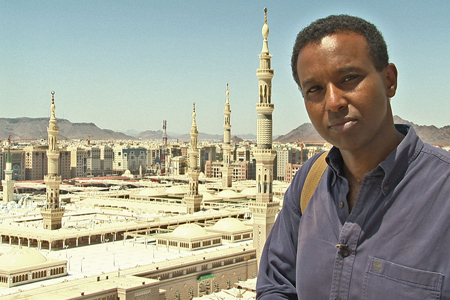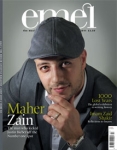
Is Muhammad a force of good?
Issue 82 July 2011
The Life of Muhammad: Part 1 aired last night, Nafe Anam looks at whether it redefines modern narratives around Islam and the Prophet.
In the first of the series, Rageh Omaar asks a crucial and poignant question: was Muhammad a force of good or evil? It seems for a series commissioned by a Muslim (Aaqil Ahmed – BBC Head of Religion & Ethics), directed by a Muslim (Faris Kermani), presented by a Muslim (Rageh Omar) and written by a Muslim (Ziauddin Sardar), the answer is maybe.
And that’s the problem with the first episode; in its bid to show an objective reflection, the program fails miserably to direct the narrative in any given way. We hear accolades of the 'man who changed the world' but no examples of how he actually achieved this. The narrative arc - or more precisely arcs - attempts to explore the life of Muhammad through modern contexts. This is understandable given that the vast majority of the audience would have never come across Muhammad in any other way. What is less understandable is the fact that all the contextual elements are negative. We are paraded through a list of modern flash points, from the 9/11 attacks at the beginning of the film to the marches and book burnings in Bradford at the end, but there are no positive modern flash points – no positive modern contexts.
Even when the episode redeems itself by exploring Khadijah – the Prophet’s first wife - and their unusual marriage, we only get the negative snipe of how the modern Muslim world fails to live up to such a legacy. And I'm sure we fail in every possible way but there are also amazing stories where we live up to the Prophet’s great legacy. It’s astounding that there were no mentions of powerful and incredible modern Muslims who, in the footsteps of Khadijah, are brilliant businesswomen, politicians, sports personalities and more.
Ironically, however, the first episode is able to handle the Prophet’s life, in its own historical context, in a better light – sometimes quite beautifully and in a compelling way. We are treated to the normality and humanness of the Prophet through the exploration of his birth. There was no star to mark it, no kings bearing gifts and no extraordinary event symbolising the moment - and the Arabs do not celebrate it. We are also shown the non-violent character of the Prophet’s movement and how in the early years, despite persecution, there was no violent upheaval or confrontation. There is good commentary on the social justice elements of early Islam through explanations of the revolutionary fervour that ran through its message. Many of the early converts were either aristocratic or people on the margins of society; by bringing them together, early Islam proved to be a social movement with justice at its core. There are moments of great documentary drama that beautifully explore the religious significance of Muhammad’s life. My favourite scene is that of the first revelation, where Rageh captures the unworldly experience of Divine contact and the drama of the consecutive commands of Iqra (Read!). The bewildering feeling of awe and disbelief is narrated with great passion and eloquence, befitting this epic and defining moment.
Overall, the series looks promising and well worth a watch; however, it missed the opportunity to redefine the modern narratives around Islam and its final Prophet. Perhaps these are addressed more effectively in the following shows – I will be looking out for it.
The Life of Muhammad continues on BBC2 next Monday at 9pm.
Bookmark this |
|
Add to DIGG |
|
Add to del.icio.us |
|
Stumble this |
|
Share on Facebook |
|
Share this |
|
Send to a Friend |
|
Link to this |
|
Printer Friendly |
|
Print in plain text |
|


Comments
2 Comments
1
Aasim Azizurehman
1 Aug 11, 18:09
I think that the programme was a massive let down!
There was nothing inspirational about our beloved
Prophet(SAW). It was the perfect opportunity to
enlighten people about how amazing the
Prophet(SAW) was. By the was Sr Julie, Rageh
wasn't in Cave Hira when he was talking about the
revelation. The cave is only big enough to fit one or
two people maximum, which is one of the special
features of the cave.
I hope that another broadcaster can produce a
much better documentary about our Beloved
Messenger (SAW).
2
Julie Siddiqi
12 Jul 11, 10:21
I had been looking forward to this and indeed I
insisted the kids watch it with us as well. To be
honest I am left slightly disappointed. I agree, the
close up shots of the Kaaba were great and so nice
to see. I wanted to be there! I loved the fact that
Rageh actually sat in the cave of Hira when he
spoke about the revelation. I liked the input from
the various commentators especially Karen
Armstrong and her comments about Khadijah were
wonderful! However, I found that the programme
jumped from Mecca to London, to Exeter back to
London back to Mecca to Medina etc, it was difficult
to keep up! And there weren't as many amazing
screen images as I was imagining and maybe
hoping for. Not sure the images around the Satanic
Verses, 9/11 were all necessary? I know it is
difficult picth though. I am overall really pleased
that the BBC have done this and I hope many
people learn from it and feel inspired. I will watch
the next two with slight anticipation and maybe not
such high hopes